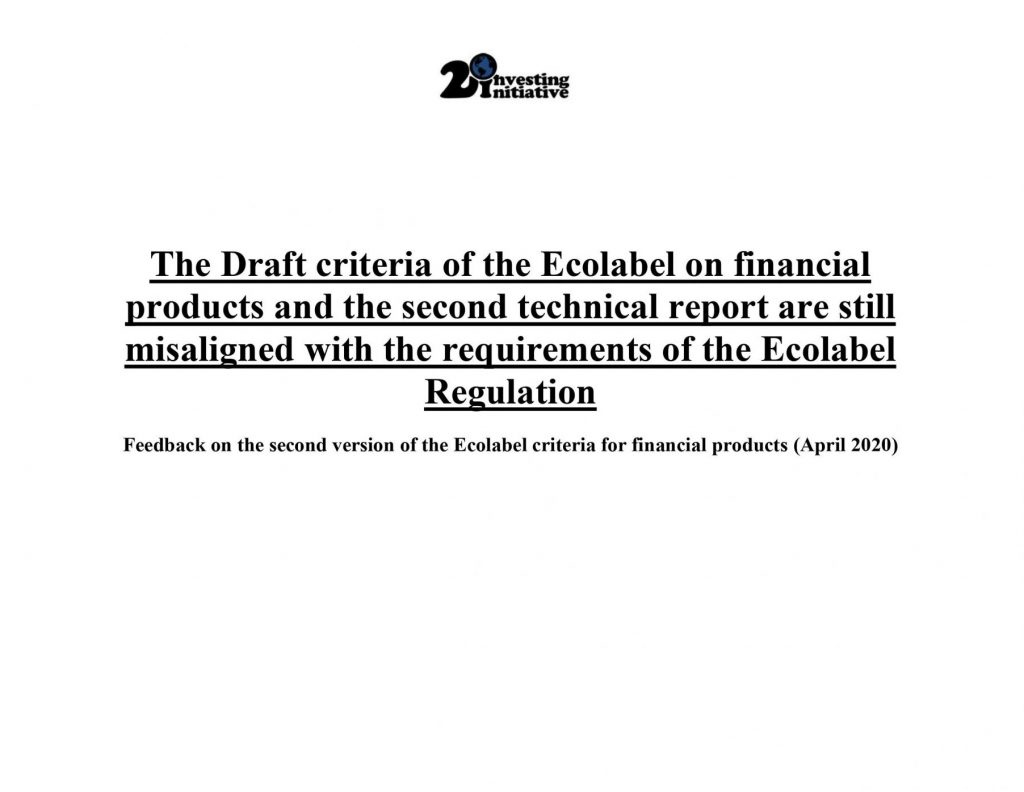According to regulation’s principals, the Ecolabel scheme is “intended to promote products with a reduced environmental impact during their entire life cycle and
to provide consumers with accurate, non–deceptive, science–based information on the environmental impact of products”. Based on the envisioned criteria, the future Ecolabel would potentially achieve the opposite, by enabling and encouraging unsubstantiated and potentially deceptive environmental ‘investor impact’ claims, based on no scientific evidence and no assessment of the environmental impact of the products.
In addition, 2DII finds that the second technical report approach is also misaligned with the regulatory requirements. Indeed, according to the Annex 1 of the Ecolabel regulation, “The technical report shall include at least the following elements: the scientific explanations of each requirement and criterion; a quantitative indication of the overall environmental performance that the criteria are expected to achieve in their totality, when compared to that of the average products on the market; an estimation of the expected environmental/economic/social impacts of the criteria as a whole; the relevant test methods for assessment of the different criteria (…)” (Regulation 66/2010, Annex 1).
The European Commission services are also subject to an obligation to “take into consideration the views of all interested parties involved in the consultation process”, provide responses to “all comments received during the criteria development process, indicating whether they are accepted or rejected and why.”and “report in detail” and evaluate “Critical and controversial issues”. As far as the issues we raised are concerned, none of these requirements have been respected.
Finally, we conclude that the conditions have not been met for drafting criteria for an Ecolabel. The Ecolabel regulation specifies that “The preliminary report must contain (…) the current and future potential for market penetration of the products bearing the EU Ecolabel” and “The draft criteria shall (…) correspond indicatively to the best 10–20 % of the products available on the Community market in terms of environmental performance at the moment of their adoption.” No product meeting the requirements of the draft criteria exist on the market today, and we did not find any retail product available on the market today that would fully meet the requirements of a future Ecolabel consistent with the Ecolabel Regulation neither (i.e. delivering a measurable investor impact).
This does not mean that such a product does not exist for institutional investors or could not be developed rapidly for retail clients. But at this stage, the Ecolabel regulation and related rules do not plan for the development of labelling criteria when no measurement of environmental impact has been done and no product with better performance can be identified. The development of an Ecolabel for financial products would therefore require ignoring or adapting the existing regulation.
To address these shortfalls, we recommend pausing the development of the Ecolabel for financial products; exploring the development of an “environmental impact” label; and making stronger efforts to prevent political interference in technical work.
About our funders: To produce this report, 2° Investing Initiative received funding from the European Union’s Life IP programme under grant agreement No LIFE18/IPC/FR/000010 A.F.F.A.P. This work reflects the authors’ views only, and the funders are not responsible for any use that may be made of the information it contains.



